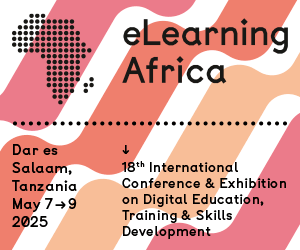ONLINE EDUCA BERLIN 2006 Takes Them All
 Berlin (GER), December 2006 (by Susanne Köhler) - Confirming its position as the world's largest international conference on technology-supported learning and training, this year's Online Educa Berlin broke all records, with 2048 conference attendees from 92 countries. The 12th Online Educa Berlin featured the latest developments from around the world, and the extensive conference agenda included presentations from renowned international experts.
Berlin (GER), December 2006 (by Susanne Köhler) - Confirming its position as the world's largest international conference on technology-supported learning and training, this year's Online Educa Berlin broke all records, with 2048 conference attendees from 92 countries. The 12th Online Educa Berlin featured the latest developments from around the world, and the extensive conference agenda included presentations from renowned international experts.
 Berlin (GER), December 2006 (by Susanne Köhler) - Confirming its position as the world's largest international conference on technology-supported learning and training, this year's Online Educa Berlin broke all records, with 2048 conference attendees from 92 countries.The 12th Online Educa Berlin featured the latest developments from around the world, and the extensive conference agenda included presentations from renowned international experts.
Berlin (GER), December 2006 (by Susanne Köhler) - Confirming its position as the world's largest international conference on technology-supported learning and training, this year's Online Educa Berlin broke all records, with 2048 conference attendees from 92 countries.The 12th Online Educa Berlin featured the latest developments from around the world, and the extensive conference agenda included presentations from renowned international experts.
Was there a trend that pervaded the highly informative sessions, lively chats, and talks in and around the exhibition stands? For sure: The arrival of the so-called "Digital Natives" in the workforce and the question of how to deal with them in terms of lifelong education seemed to be an issue that left nobody, particularly not the digital immigrants in the education departments, untouched.
In the opening plenary, George Siemens, Founder and President of Complexive Systems Inc in Canada, delivered a keynote address on how to unlock the potential of eLearning. Jean-Michel Billaut, strategic adviser to several French ministerial departments, businesses, and service providers entertained the audience while sharing his ideas on how eLearning fits within the wider community, thereby helping to overcome prejudices held by the key European players, i.e. the French, the English, and the Germans.
Daniel Siele, Director at the Ministry of Education, Science and Technology in Kenya, pointed out how much the African continent relies on mobile technology - the penetration of mobile phones being over thirty percent compared to less than two percent by computers. Therefore, eLearning providers should include these figures in their business rationale. According to his statements, the figures hold true for most of Central Africa and will form the foundation for discussion at the upcoming second eLearning Africa conference next May.
There was also appreciable informal learning going on in the hallways of the HOTEL INTERCONTINENTAL that hosted the event, and even more informal talking, with plenty of opportunity to exchange ideas and addresses.
The scene was networking at its best - a supportive environment enhanced by working group meetings and special interest group discussions, knowledge cafés, and best practice sessions. ONLINE EDUCA BERLIN 2006 was an auspicious, intimate, and communicative event - and next year's event is already beginning to take shape.










